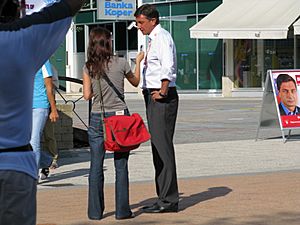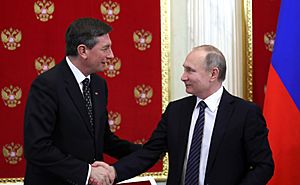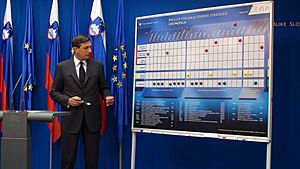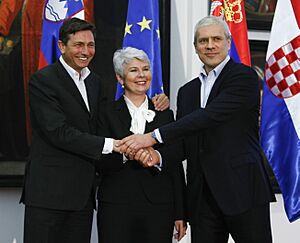Borut Pahor facts for kids
Quick facts for kids
Borut Pahor
|
|
|---|---|
| 4th President of Slovenia | |
| In office 22 December 2012 – 22 December 2022 |
|
| Prime Minister | Janez Janša Alenka Bratušek Miro Cerar Marjan Šarec Janez Janša Robert Golob |
| Preceded by | Danilo Türk |
| Succeeded by | Nataša Pirc Musar |
| Prime Minister of Slovenia | |
| In office 21 November 2008 – 10 February 2012 |
|
| President | Danilo Türk |
| Preceded by | Janez Janša |
| Succeeded by | Janez Janša |
| Member of the European Parliament | |
| In office 20 July 2004 – 14 October 2008 |
|
| Constituency | Slovenia |
| Speaker of the National Assembly | |
| In office 10 November 2000 – 12 July 2004 |
|
| Preceded by | Janez Podobnik |
| Succeeded by | Feri Horvat |
| Personal details | |
| Born | 2 November 1963 Postojna, SR Slovenia, SFR Yugoslavia |
| Political party | SKJ (before 1990) SD (1990–2012) Independent (since 2012) |
| Domestic partner | Tanja Pečar |
| Children | 1 |
| Alma mater | University of Ljubljana |
| Signature | |
Borut Pahor was the fourth President of Slovenia. He served from 2012 to 2022. Before becoming president, he was the Prime Minister of Slovenia from 2008 to 2012.
Pahor was a long-time member and former leader of the Social Democrats political party. He was a member of the National Assembly for several terms. He also served as its speaker from 2000 to 2004. In 2004, he was elected as a Member of the European Parliament (MEP).
After his party won the 2008 Slovenian parliamentary election, Pahor became prime minister. His government faced an economic crisis. In 2011, his government lost a vote of confidence. He continued as prime minister until February 2012. In June 2012, he decided to run for president. He won the 2012 Slovenian presidential election against the current president, Danilo Türk. In November 2017, Pahor was re-elected for a second term.
Contents
Early Life and Education
Borut Pahor was born in Postojna, which was then part of Yugoslavia. He grew up in Nova Gorica and later moved to Šempeter pri Gorici. His father passed away when Borut was young. His mother, Iva Pahor Martelanc, raised him by herself.
After finishing high school in 1983, Pahor went to the University of Ljubljana. He studied public policy and political science. He graduated in 1987. His final paper was about peace talks between countries that were not allied with major powers. This paper won him a special award for students.
Political Journey
Starting in Politics
Pahor began his political journey in high school. At 15, he led the student section of the Alliance of Socialist Youth in Nova Gorica. This was a youth group connected to the Communist Party. During his university years, Pahor joined the ruling Communist Party.
In 1987, he ran for a leadership position in a university youth group. This election was important because it was one of the first truly democratic elections in Yugoslavia. Pahor's team did not win against a more liberal group. This led to the youth group becoming more independent from the Communist Party.
Pahor continued his political career within the main Communist Party. He became well-known in the late 1980s. He strongly supported reforms within the party. In 1988, he was one of the first high-ranking members to suggest that the Communist Party should not be the only political power in Slovenia. This helped open the way for different political parties.
In 1989, Pahor helped create and lead the Democratic Forum. This was a youth group within the Communist Party. It was meant to be a balance to the other youth group, which was now against the communists. In the same year, he became the youngest member of the Central Committee of the League of Communists of Slovenia. In 1990, he was part of the Slovenian group at the last meeting of the League of Communists of Yugoslavia.
Entering Parliament
In April 1990, Slovenia held its first free elections. Pahor was elected to the Slovenian Parliament. He was part of the League of Communists - Party of Democratic Reform. He became a leader of the party's reform wing. This group wanted to move away from the communist past and embrace a free-market economy.
Throughout the 1990s, his party lost support. In 1997, Pahor was elected as its president. He aimed for a middle-ground approach in politics. In 1997, he tried to form a government with other left-wing parties. He was suggested as the Minister of Foreign Affairs, but this plan did not get enough support in parliament. His party remained in opposition.
Leading the National Assembly

In 2000, Pahor's party joined a government coalition. Pahor was elected speaker of the Slovenian National Assembly. This was a very important role for him. He was known for being fair and not taking sides too much. This earned him respect from other political groups.
As speaker, he pushed for a public event to remember Jože Pučnik. Pučnik was an important figure who opposed communism. Some members of the ruling coalition were against this idea at first. Pahor also strongly supported Slovenia joining NATO. This was a military alliance, and some people on the left side of politics were against it.
In June 2004, Pahor was elected to the European Parliament. He was part of the Socialist group there. He worked on committees dealing with budgets and the constitution. In October 2004, the center-left government in Slovenia lost power. Pahor then became a key figure in the opposition. By 2007, his Social Democrats party became the second-largest political force in Slovenia.
In 2007, Pahor thought about running for president. However, because his party was doing well, he decided to support Danilo Türk for president instead. He chose to focus on leading his party in the 2008 parliamentary elections.
Prime Minister of Slovenia (2008–2012)
Borut Pahor served as Prime Minister of Slovenia from November 2008 to February 2012. He led a government formed by the Social Democrats and other parties.
His government faced the global economic crisis. They suggested economic changes, but these were not approved by the opposition or in a public vote in 2011. However, voters did approve an agreement with Croatia. This agreement aimed to solve a border dispute between the two countries.
In 2011, some parties left Pahor's government. The opposition accused the government of problems with the economy. Pahor asked the Parliament for a vote of confidence. On September 20, the Parliament voted against his government. This meant the government fell. Pahor said he had "full faith in our people and the future of Slovenia."
After this, the Parliament had to choose a new prime minister. If they couldn't, the President would call for early elections. Most parties wanted early elections. In the elections on December 4, 2011, Pahor's party lost many seats. However, Pahor said he was happy with the result. In June 2012, Pahor ran for re-election as president of the Social Democrats but lost. After this, he announced he would run for President of Slovenia. His party and another centrist party supported his presidential campaign.
President of Slovenia (2012–2022)

Winning the 2012 Election
Pahor won the second round of the 2012 Slovenian presidential election with 67.3% of the votes. The results were confirmed by the Electoral Commission of Slovenia.
After winning, Pahor said this was "only the beginning, the beginning of something new." He emphasized that people need trust, respect, and tolerance. He promised to keep working to help solve the nation's problems.
With this victory, he became the youngest President of Slovenia ever. He also became the only politician to have held all three top political roles in Slovenia: speaker of the National Assembly, prime minister, and president.
As president, Pahor tried to be very active. He met with young people at public events. He also spoke at major events across the country. He met with leaders like Vladimir Putin. He encouraged Putin to try and resolve the Russo-Ukrainian war. He also suggested a meeting between Donald Trump and Putin in Ljubljana.
Re-election in 2017
Pahor won the second round of the 2017 Slovenian presidential election. He received about 53 percent of the votes. His opponent, Marjan Šarec, received 47 percent. The number of people who voted was about 42 percent. This was the lowest turnout for a presidential election since Slovenia became independent in 1991.
Awards and Honors
Borut Pahor has received many awards and decorations from different countries. These awards recognize his service and contributions.
 Austria: Grand Star of the Decoration of Honour for Services to the Republic of Austria (2022)
Austria: Grand Star of the Decoration of Honour for Services to the Republic of Austria (2022) Bulgaria: Sash of the Order of the Balkan Mountains (2016)
Bulgaria: Sash of the Order of the Balkan Mountains (2016) Cyprus: Grand Collar of the Order of Makarios III (2019)
Cyprus: Grand Collar of the Order of Makarios III (2019) Czech Republic: Collar of the Order of the White Lion (2017)
Czech Republic: Collar of the Order of the White Lion (2017) Estonia: Collar of the Order of the Cross of Terra Mariana (2019)
Estonia: Collar of the Order of the Cross of Terra Mariana (2019) Germany: Grand Cross Special Class of the Order of Merit of the Federal Republic of Germany (2014)
Germany: Grand Cross Special Class of the Order of Merit of the Federal Republic of Germany (2014) Italy: Knight Grand Cross with Collar of the Order of Merit of the Italian Republic (2014)
Italy: Knight Grand Cross with Collar of the Order of Merit of the Italian Republic (2014) Latvia: Recipient of the Cross of Recognition First Class (2019)
Latvia: Recipient of the Cross of Recognition First Class (2019) Norway: Grand Cross of the Order of St. Olav (2019)
Norway: Grand Cross of the Order of St. Olav (2019) Portugal: Grand Collar of the Order of Prince Henry (2021)
Portugal: Grand Collar of the Order of Prince Henry (2021) South Korea: Recipient of the Grand Order of Mugunghwa (2021)
South Korea: Recipient of the Grand Order of Mugunghwa (2021) Ukraine: Member of the Order of Liberty (2016)
Ukraine: Member of the Order of Liberty (2016) Ukraine: Order of Prince Yaroslav the Wise, 1st class (2021)
Ukraine: Order of Prince Yaroslav the Wise, 1st class (2021)
Personal Life
Borut Pahor lives with his partner, Tanja Pečar. They have a son named Luka. Besides his native Slovene, he can speak English, French, Italian, and Serbo-Croatian fluently.
See also
 In Spanish: Borut Pahor para niños
In Spanish: Borut Pahor para niños
 | Lonnie Johnson |
 | Granville Woods |
 | Lewis Howard Latimer |
 | James West |



